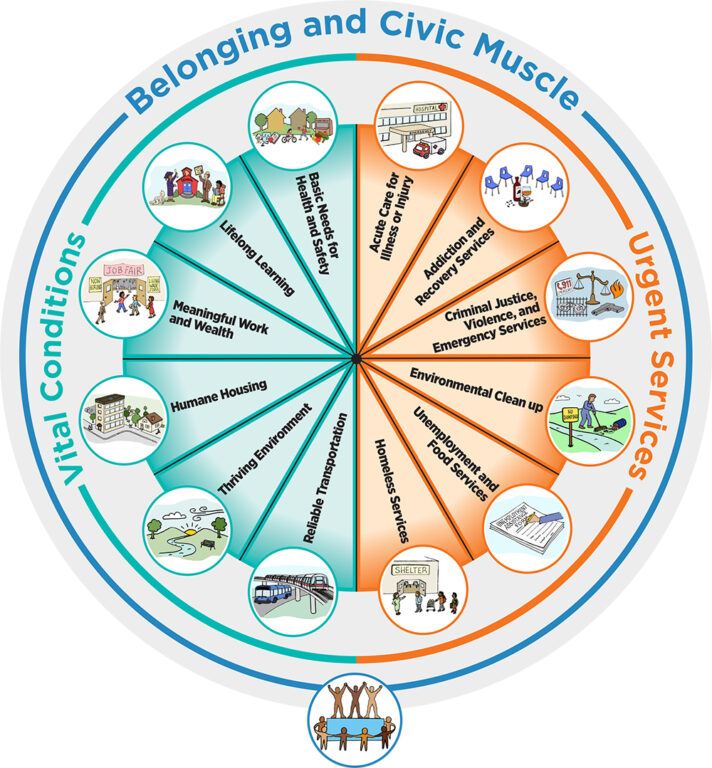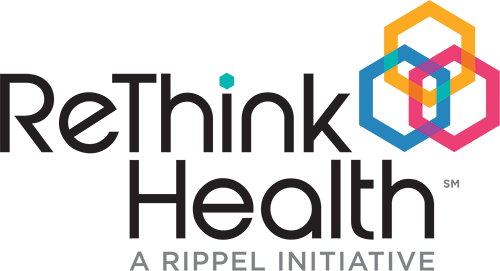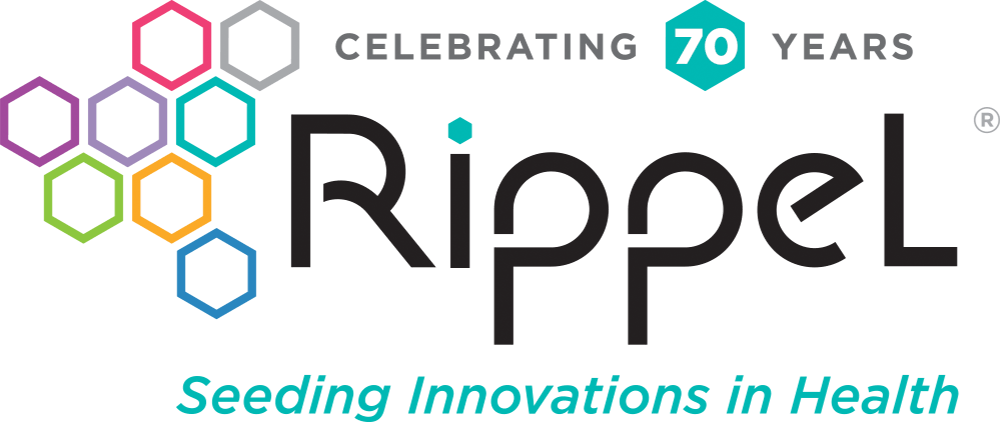ReThink Health’s Portfolio Design for Healthier Regions team is working with stewards in Palm Beach County, Florida, and a three-county region in southeast Michigan to explore what it will take to reallocate resources to create more equitable regional systems for health and well-being. The stewards come from funding organizations willing to work together across boundaries to create the conditions required for change. Their focus is on rethinking how they invest and coordinate resources to shift from urgent services (the kind anyone under adversity would need to temporarily regain or restore their health and well-being) to vital conditions (efforts that not only have the potential to improve health and well-being but also prevent harm and avert the need for urgent services), knowing that as a region’s vital conditions improve, urgent services are less needed and communities are better positioned to thrive. Our previous blog in this series explored how health philanthropy can cultivate greater interdependence and belonging among regional partners. Today, Ella provides a look inside Palm Beach County to see how stewards are embracing a new role of fostering belonging among all individuals and organizations in their community to achieve equitable health and well-being and build civic muscle.
The Stew BLOG
Cultivating Belonging and Civic Muscle to Advance Equity
ReThink Health’s Portfolio Design for Healthier Regions asks the big question: What will it take for stewards to change the way they allocate resources and create equitable regional systems for health and well-being? In Palm Beach County, Florida, stewards explored this question by first examining their current investments and how they compared to what they hoped to achieve, i.e., they looked at the balance of investments in vital conditions and urgent services. Their discussions led to the insight that belonging and civic muscle play an out-sized role no matter what the organization wants to do. They are both vital conditions and critical factors for success in virtually every other kind of endeavor to enhance equitable health and well-being.

What are Belonging and Civic Muscle?
ReThink Health defines belonging and civic muscle as the special capacities of people and institutions to build a sense of community (belonging) and the power (civic muscle) to influence the policies, practices, and programs that affect them.
For Palm Beach County stewards, building those capacities is centered on equity. “Belonging and civic muscle are grounded in equity,” said Abby Goodwin, vice president of grants and community investments at Palm Health Foundation. “It’s a ‘we’re one of many’ mentality. We have a responsibility to one another. It’s understanding who is living around you and making the connection to people who don’t see themselves represented.”
Tanya Palmer, chief program officer at Children’s Services Council of Palm Beach County (CSC), sees how her organization is missing the opportunity to connect to residents more deeply because of the way she and her colleagues present themselves. She also sees how power dynamics affect belonging and civic muscle. “ReThink Health is helping us understand perception vs. reality for how CSC is viewed by the community,” said Palmer. “We’ve known we don’t want to show up as a 64,000-pound gorilla for some time, but we were surprised how entrenched that view is for providers and community members. We need to show up in a way that appreciates and recognizes the resident leadership that is fully present in a community as belonging and civic muscle. Maybe our role isn’t to fix the community, but rather to come in with scaffolding and support for what is already there, or we don’t enter certain spaces and become disruptive.”
A Different Kind of Capital
As stewards looked for examples of how they have invested monetarily in both belonging and civic muscle, they realized that it is not easy to identify them as “investments” with budget lines.
The stewards agreed that both belonging and civic muscle can be built partly through direct funding for activities, such as youth leadership development, community organizing, or outreach toward those who are routinely marginalized. A more sustainable effort, however, may be through indirect design principles or simple rules that infuse opportunities for authentic connection and contribution across all aspects of organizational policy, practice, service delivery, and investment priority. In other words, it doesn’t necessarily take a lot of new, discretionary money to start building belonging and civic muscle–it just takes rethinking.
Tammy Fields, director of the Palm Beach County Youth Services Department, sees how belonging and civic muscle can grow when organizations become more intentional about honoring every person’s dignity and inviting their special talents in every interaction, with everyone, every day. “The project has strengthened the commitment of those involved so that belonging and civic muscle are always considered in any of the decisions being made in whatever scenarios are being presented,” she said.
The five simple rules provide a “north star” for:
- Privileging community voice
- Creating bi-directional communications networks, especially for the most isolated
- Eliminating barriers and exploring upstream solutions
- Amplifying resources
- Acknowledging power dynamics to dismantle privileged relationships and the conditions that hold inequities in place
For James Green, director of the Palm Beach County Community Services Department, the simple rules are core values the community can embrace. “Most people in our county will agree that these are things we value—making sure that community has a say in what the services should be rather than agencies dictating what the services should be,” said Green. “The simple rules give us guidance for aligning and adjusting the ways we operate and how we assess programs. And they provide a pathway to transfer the work that we have been engaged in with ReThink Health to the community in a way that will live on.”
Diffusing the simple rules in their own organizations and out into the community, however, has its challenges. Green observes that the absence of some major system players in the project resulted in the rules not carrying as much weight as they could. Fields acknowledged an internal struggle to shift the mindsets of some staff who approach solutions as “knowing what’s best for everyone versus listening to learn,” which will take time and patience to overcome. For other organizations that already have their own set of core values, the challenge is finding ways to disseminate with intention and with respect. Palmer’s plan is to take the simple rules and connect them to the work, conversations, and philosophies that are underpinning what CSC is engaged in.
Lauren Zuchman, executive director of BeWellPBC, sees how her initiative and the deep ties it has established with residents can help systems overcome their challenges for operationalizing the simple rules by being their conduit to community. “Systems [of care including health care and social services] can’t get totally out of the way, but we can sit side by side with communities and find ways to co-design solutions together—that’s civic muscle,” said Zuchman.
Belonging and Civic Muscle in a Pandemic
COVID-19 accelerated the opportunity for Palm Beach County regional partners to put their project learning to the test. The crisis allowed the stewards to use lessons learned to look at intentional interdependence, how they were allocating funds, and new ways to build belonging and civic muscle.
Fields saw early in the pandemic how belonging and civic muscle can be easily pushed aside to focus on urgent matters. “When we have an emergency, all of the things that we do to make sure our community has a voice are put aside. We’re now starting to realize we need to be more prepared for various types of emergencies and involve the community in the planning. It really fits into how equity issues are being addressed. We have to build the trust in our community so that when these unique situations happen, there is a trust factor when decisions are being made that they’re not being made without the community,” she said.
The experience is giving the stewards hope that as they shift how they think about their own roles, relationships, and investments, other organizations and stakeholders may begin to shift, too. “It’s about creating the connective tissue and the pathways that build belonging and civic muscle,” said Palmer. “We aren’t the only builders of it. That has to be built with other stakeholders.”
Next in the blog series: How Stewards can Drive Social Change
[email protected] On social media, #ThinkWithUs

